Containing God’s Presence
Over the course of a year, the Jewish calendar bends to the arc of the Torah reading cycle and assumes its shades. With the end of summer and the start of the Jewish new year, the world is created anew in Genesis and nearly destroyed by flood in the story of Noah, a parsha (portion) which coincides with the start of the rainy season in Israel. As the autumn chill sets in and the nights grow longer, we follow the story of the patriarchs and matriarchs, who look up at the stars and journey through the desert guided by divine promise and by visions of God in the darkness of night. On the coldest and darkest days of the year, we read of Joseph’s descent into the pit, cast down by his jealous brothers, only to rise to prominence in Egypt as the winter days begin to grow longer and more hopeful. Wells and wombs give way to politics and persuasion, and sometime around the start of the secular new year we begin Exodus, the narrative of our deliverance from Egyptian bondage, as part of our spiritual preparation in the months before Passover. Then we immerse ourselves in the details of sacrificial worship as spring sets in, reading of sin and purification as the first flowers break through the softening soil. Just when it starts to get warmer after Passover we trek with the Israelites through the desert, and then, when it’s too hot to move forward anymore, we stop to hear Moses recount it all over again in Deuteronomy during the dog days of summer.
The Torah reading cycle provides the structure not just for the Jewish year but also for countless volumes of commentary on the biblical text, including Rabbi Shai Held’s brilliant new two-volume collection The Heart of Torah, Essays on the Weekly Torah Portion. Held offers two discussions of each parsha, perhaps a reminder that there is never just one way to interpret Torah. He describes these discussions as essays rather than sermons, which is the more common rendering of the Hebrew term “drashot.” This is apt, since both “essays” and “drashot” have the sense of a search or attempt rather than the statement of a settled position; Held is deeply serious but never sermonic. Interestingly, Held notes that the meaning of the term “drash” evolves over the course of the Bible: In Genesis and Exodus, it is used to refer to seeking out God’s will, whereas in later books, such as Ezra, the object of this inquiry is not God but the Torah: “Instead of inquiring of God directly, people now seek guidance through studying God’s Torah.” This is essentially Held’s project, seeking guidance—especially moral instruction—by inquiring of the text in order to get at its heart.
The “heart of Torah,” for Held, is chesed, which he translates as “love and kindness.” As he writes, “[w]hen all is said and done, religion is, in large part, about softening our hearts and learning to care.” Most of his essays begin with a close reading of the biblical text, which in turn leads him to a claim about God and then to an ethical message for his contemporary readers. In “People Have Names: The Torah’s Takedown of Totalitarianism,” he rejects the conventional interpretations of the Tower of Babel story:
Genesis 11 is not a simple morality tale about a human attempt to storm the heavens and displace God. Nor, conversely, is it a primitive allegory about an insecure deity who is so threatened by human achievement that God needs to wreak havoc on the best-laid human plans. The narrative is also not placed where it is in the Torah in order to explain the vast multiplicity of human languages. Nor is it a lament about some lost primeval unity.
Having toppled these readings, Held then proceeds to construct his own.
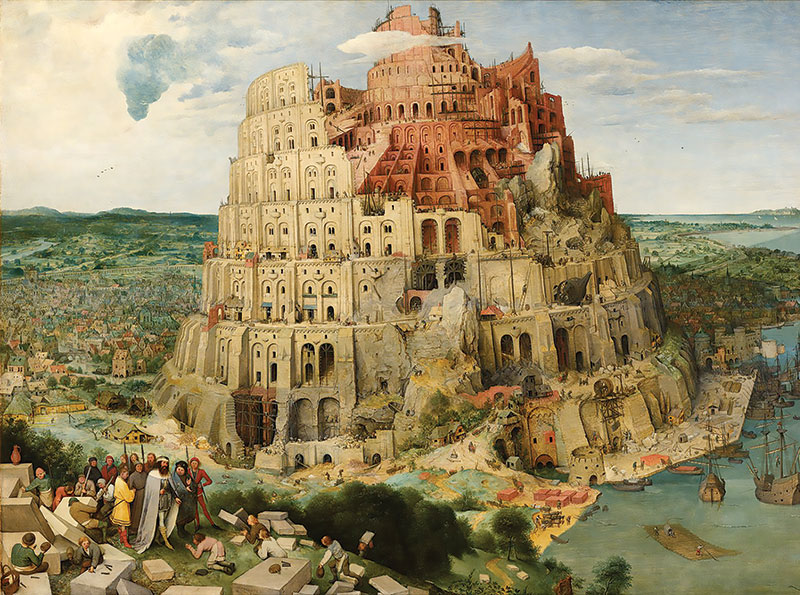
Through a close reading of the nine biblical verses that comprise the Tower of Babel story, Held demonstrates that it is really the city and not the tower as such that is the focus of biblical condemnation. This is why it is the city which is described as being punished at the end of the story. (Held might have added that whenever both city and tower are mentioned, the city is always mentioned first.) In short, something is rotten in Babel, and the tower is merely an expression of this deeper ethical taint.
Held considers the punishment that God metes out to the builders—scattering them “over the face of the whole earth” (Gen. 11:8)—in light of the blessing He gives to Adam and Eve and then to Noah to “Be fertile and increase, and fill the earth” (Gen. 1:28, 9:1). How, Held asks, can the Bible describe human dispersion as both a blessing and a curse? His elegant solution is that the builders are being punished because what they most fervently desire—to build a city and tower lest they be scattered—is the opposite of what God most desires for humanity. “God’s ‘punishment,’ then, may not ultimately be a punishment at all, but a reaffirmation of the initial divine blessing in the face of human refusal and obstruction.”
But why is God so intent that people disperse? Here, Held turns to a classic 19th-century commentator known by the acronym Netziv (Naftali Zvi Yehuda Berlin) for a suggestive reading. The Netziv reads the Bible’s description of the people as having had “the same language and the same words” (Gen. 11:1) as meaning that “their words . . . were all the same.” Held takes this one step further, explaining that “total uniformity is necessarily a sign of totalitarian control.” The problem with the Babel builders, then, was their intolerance of independent thought. “If everyone says the same words and thinks the same thoughts, then a society emerges in which there is no room for individual tastes, thoughts, and aspirations, or for individual projects and creativity.”
Held grounds this reading in both the text and its context: No names are mentioned in the verses about Babel, and the story follows on the heels of a long genealogy of Noah’s children. He buttresses this claim by invoking the contemporary Israeli American commentator Judy Klitsner, who points out that the Babel story is followed by a story about a man literally named Name—Noah’s son Shem—as if to emphasize the namelessness that precedes his mention. Held goes on to cite a midrash from Pirke d’Rabbi Eliezer which describes the builders as caring more about bricks than people; the collective project was more important than the individuals making up the collective. And so uniformity entails anonymity, and anonymity implies insignificance.
What of Babel’s assault on heaven as an attack on God? Though he had previously rejected this reading as too simplistic, he now returns to it through the back door. Yes, Babel is an attack on God, but it is an attack on God because it is an attack on human uniqueness.
An attempt to root out human individuality is an assault on God. Jewish theology affirms that each and every human being is created in the image of God, and that our uniqueness and individuality are a large part of what God treasures about us.
The story of Babel is mythic in its universalism, describing a time before the world was divided into languages, religions, or nationalities, so it is not surprising that the message Held draws from this story is also universal. But this is true of the majority of the essays in this collection. Held explores how the Bible calls upon us to conduct ourselves in the world, beyond, or perhaps even prior to, Jewish law. Even his essays that are ostensibly about what it means to be Jewish are also about what it means to excel at being human. In his essay on Vayetze, for instance, Held explores the meaning of the term “Yehudi” (Jew), which comes from Leah and Jacob’s son Yehudah. Held traces the evolution of Leah’s emotional state over the course of their marriage, paying close attention to the names she chooses for each of her first four children. He notes that in naming her fourth child Yehudah, from “I will praise,” Leah manages to turn her unfulfilled longing into gratitude.
Leah has somehow found the courage to accept that her life is not going to turn out as she had hoped. She has spent years aching for the love of her husband . . . But now, suddenly, she sees that this constant yearning will only generate more fantasy and illusion.
Held draws on a talmudic passage in which Leah is identified as the first person in the world to express gratitude to God. He is quick to note that this is clearly not the case. Rather, what sets Leah apart is her ability to be grateful in the midst of sorrow. Given that Yehudah’s name becomes the name for the entire Jewish people, Held writes that “a Jew is, ideally, a human being who, like Leah, can find her way to gratitude without having everything she wants or even needs.”
In his essay on the first parsha in Deuteronomy, Held argues that God’s love for Israel is not on account of Israel’s merits but is “pure grace,” as he proves from the story of God’s choice of Abraham. Drawing on the prophet Amos’s criticism of Israelite complacency, he shows how biblical chosenness requires a higher degree of accountability and moral responsibility. Held reads the verses in Deuteronomy that describe the provision of land to Israel and God’s instructions concerning how the Israelites should pass through the land of other nations as showing that God cares about the welfare of other nations and charges Israel to do so as well. He insists that “[a] careful reading of Tanakh thus demonstrates that election, or chosenness, is not a function of merit; it does not give the people a moral blank check; nor does it suggest that Israel is God’s only concern.”
Held’s ecumenicism is also evident in the range of sources he cites. He quotes liberally from the Talmud and midrash, as well as from medieval commentators, Hasidic masters, and contemporary interpreters (including Israelis, such as Shmuel Faust and Rav Shagar, who are largely unknown to American readers). He is receptive both to traditional exegesis and to modern scholarship, often showing how the Torah’s theological and ethical claims are all the more radical given the contrast with the ancient Near Eastern context from which they emerged. Moreover, he incorporates non-Jewish insights and contributions from early Christian sources to works by contemporary Protestant scholars.
Of course, the majority of commentators Held draws upon are from within the rabbinic tradition. Occasionally we hear women’s voices, particularly Nechama Leibowitz or contributors to the anthology The Torah: A Women’s Commentary, but Held’s egalitarianism is most pronounced when he discusses the lives of biblical women as human actors on the scriptural stage, each with her own feelings and dreams. For instance, he considers Sarah’s barrenness from her perspective—how she must have felt when Abraham prayed for Avimelech to have children but not for his own wife, and what it would have been like when Abraham laughed at God’s promise of a child for her and responded with a prayer for Ishmael, Hagar’s son.
For Held, biblical women and men are judged by the same ethical standards. He regards Jacob’s lack of compassion and hospitality in Parshat Vayishlach as standing in stark contrast not just to that of his grandfather Abraham but also to that of his mother, Rebekah. In his essay on Miketz, he traces the moral evolution of what it means to be one’s brother’s keeper, a lesson that Cain spurns, Yehudah struggles to learn, and Miriam seems intuitively to grasp. For Held, gender is not a barrier to comparison; these characters are far more united by their common humanity than they are divided along gender lines. In this sense, Held’s commentary is more radically egalitarian than any book expressly about biblical women could ever be.
In his most sanguine essays, on the second half of Exodus and on Leviticus, Held argues that the Mishkan, the portable sanctuary which the Israelites carried with them in the desert, was, like Shabbat, modeled after Eden. The Torah’s description of its construction offers a picture of what the ideal communal project would be like—motivated by genuine generosity and a respect for the sanctity of the cause.
As Held contends in his essay on Parshat Teruma, the Mishkan offers a glimpse of a reality in which the world is a temple for God’s presence and in which God’s presence serves as a model for how we can best be present for one another. This conception of the Mishkan emerges from his analysis of tzimtzum, a notion that is understood in opposite ways by the talmudic sages and by the kabbalists. As the essay unfolds, Held provides an ingenious synthesis of these two understandings which he characteristically transposes from the theological to the ethical plane.
The great 16th-century kabbalist Rabbi Isaac Luria taught that God made space for the world to exist by contracting or withdrawing the divine presence into itself, a process he referred to as tzimtzum. And yet, as Held notes, tzimtzum was originally a rabbinic term, and “for the Talmudic sages it means something very different . . . than it meant for Luria.” To explain this meaning of the term, Held cites a midrash from Pesikta d’Rav Kahana, a collection of homilies that predates Luria by about a millennium. The midrash relates that Moses was incredulous when God instructed him to build a tabernacle for God. How could any structure possibly contain the omnipresent? God responded to Moses that He would “descend and contract” His presence on earth. Thus, the kabbalistic tzimtzum is about a divine withdrawal to make space, whereas the rabbinic tzimtzum is about “intensified presence.” Held quotes Gershom Scholem’s remark that Luria inherited the rabbinic term and “stood it on its head,” but Held is really interested in how these two meanings of the term can coexist: “Taken together these Rabbinic and Lurianic notions of tzimtzum convey the importance of being present while making space.”
Central to Held’s theology is the notion that God’s actions are a model for ours. To follow the ethical charges of the Torah—to visit the sick; to be kind to the widow, the orphan, and the stranger; to judge poor and rich alike; to cherish human uniqueness—is to walk in God’s ways. Held’s synthesis of both meanings of tzimtzum—Lurianic withdrawal and rabbinic intensified presence—is not just about how God is present in the world but also about how we should be present for one another in our human relationships. Held finds intimations of this idea in an essay by Martin Buber called “Distance and Relation.” Buber argued that what he called a “primal setting at a distance,” a recognition that the other is independent of oneself, must precede any “entering into relation.” As Held writes, translating this insight into everyday human terms:
One of the core challenges of loving a friend or a spouse is to learn to be completely present . . . while also making space for our partner to be who he or she is, independent of us. . . . Too much presence suffocates our partner . . . Too little presence constitutes abandonment.
Held’s commentary ends where the Torah ends, leaving us all still in the wilderness—but also sending us back to creation to begin the Torah reading cycle anew each fall, trying once again to draw out the Torah’s enduring meaning. Perhaps not surprisingly, then, what lingers and resonates most upon reading through these volumes is the message Held was offered as a teenager, at the beginning of his own spiritual journey. In one of the rare personal moments in these essays, he writes that he spent his teens preoccupied with questions of faith and once wrote a 15-page handwritten letter—“[a]s only an angst-ridden adolescent could”—confessing his struggles to the late Rabbi Louis Jacobs, whose open-minded traditionalism had inspired him. Jacobs wrote back to Held: “Remember always . . . that the search for Torah is itself Torah and that in the very search you have already found.”
Comments
You must log in to comment Log In
Suggested Reading
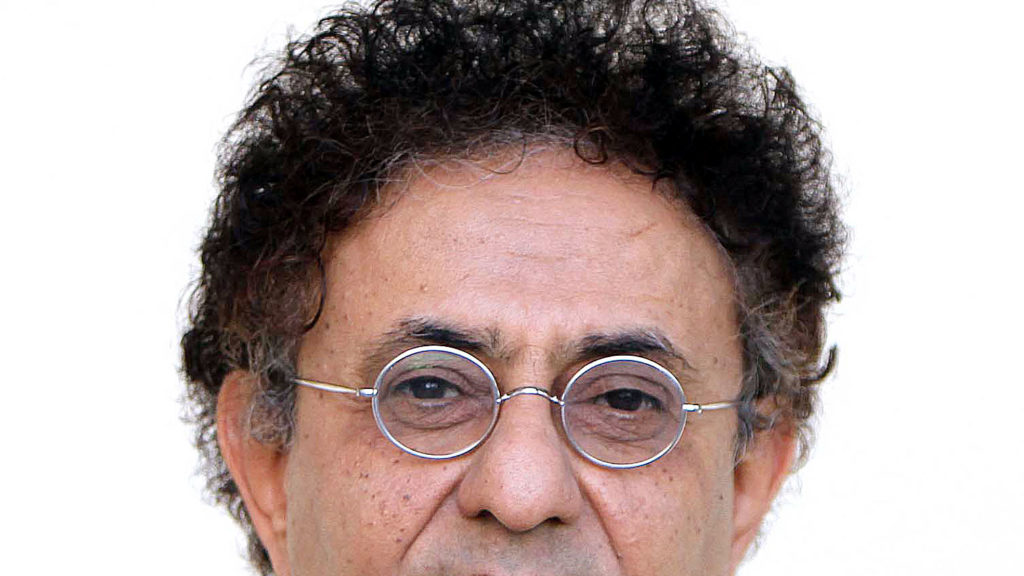
Manufacturing Falsehoods
An immense echo-chamber has been built, and the line is always the same: Israel is not allowed to be a country like any other.
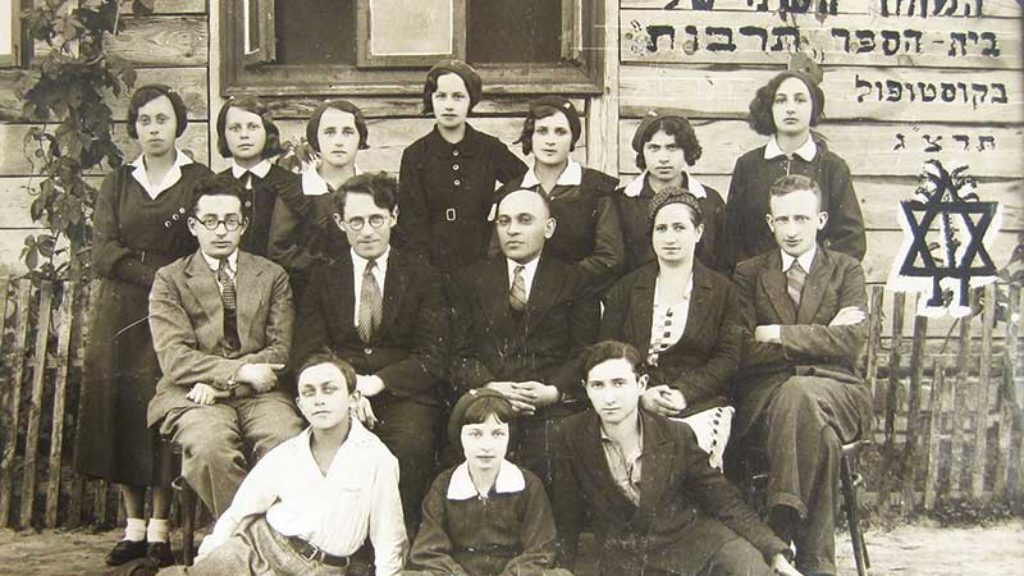
Adventure Story
The story of Hebrew is a great story because there is nothing inevitable about it. Whether it was the period of the Bible or the Mishnah or Maimonides, there was always a danger, often the likelihood, that Hebrew would be lost in the break-up of great communities and subsequent migrations.
Tattooing God’s Name, a Jewish Adventure Out West, and Ultra-Orthodox Voting Patterns
A round-up of three new and notable articles in Jewish studies.
Poems Like Mountains
“I was a year old,” Rivka Miriam says, “and my father would hold me in his arms and throw me up and down and I laughed and laughed and laughed. Each time he threw me up he’d yell in Yiddish ‘Rivkela Rivkela where’s Savta?’ ‘Killed.’ ‘Rivkela Rivkela where’s Miriam?’ ‘Killed.’ ‘Rivkela Rivkela where’s Chaim?’ ‘Killed.’ He’d say all the names…
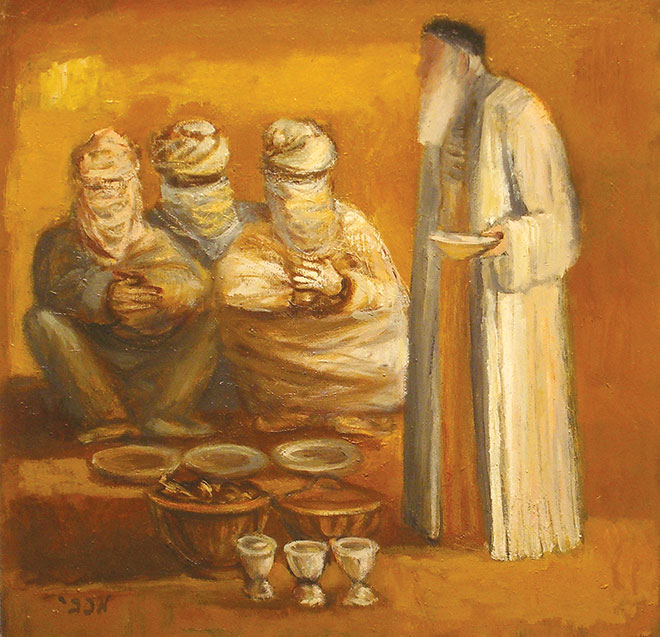
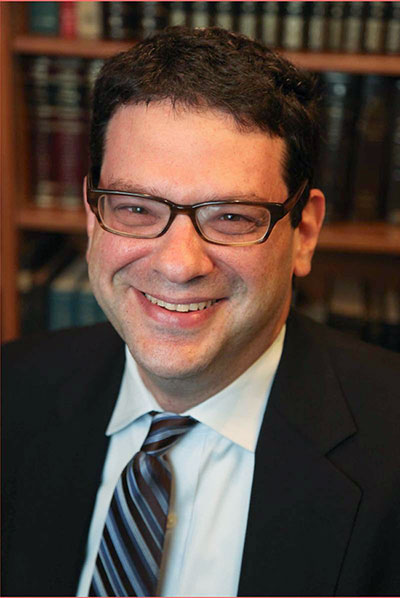
jenifernech
Excellent review. I will purchase Rabbi Held's books. This is my 2nd year to study the Torah from beginning to end. I studied with the late Rabbi Jehoshua Gordon on Chabad.org. Also, I loved your book, If All the Seas Were Ink!